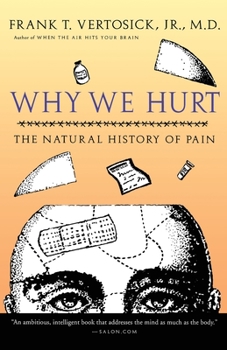Why We Hurt: The Natural History of Pain
Select Format
Select Condition 
Book Overview
A top neurosurgeon and acclaimed author's unique and highly readable study of the paradox of pain, with fascinating anecdotes on childbirth, migraines, cancer, and more. Medical science has made brilliant discoveries over the last century but as any cancer patient can attest, it has yet to conquer, or even fully comprehend, pain. Beginning with his own battle against severe migraines, and citing numerous case studies of his patients, in Why...
Format:Paperback
Language:English
ISBN:0156014033
ISBN13:9780156014038
Release Date:June 2001
Publisher:Houghton Mifflin
Length:312 Pages
Weight:0.65 lbs.
Dimensions:0.8" x 5.8" x 8.4"
Customer Reviews
5 ratings
A terrible instrument
Published by Thriftbooks.com User , 22 years ago
C.S. Lewis said in his book, "The Problem of Pain": "Pain as God's megaphone is a terrible instrument." It gets our attention and warns us of danger. Unfortunately, some doctors don't listen to that same megaphone when treating their patients.According to a recent "New York Times" article, "More than a third of seriously ill patients who requested that doctors ease their discomfort instead of prolonging their lives appear to have had their wishes overlooked, a new study [published in the "Journal of the American Geriatrics Society"] reports"."Why We Hurt" claims that, "three of four cancer patients will die in poorly controlled pain, and the percentage climbs higher still for those succumbing to malignancies with a talent for invading bones and nerves, including cancers of the breast, prostate, rectum, pancreas, and cervix."This must be disquieting information for people who are suffering from terminal illnesses like cancer or AIDS, especially since doctors already tend to undermedicate for pain---think of all of the criminal and civil lawsuits pending for over-prescription of OxyContin, and it is easy to understand why some doctors avoid the heavy-duty painkillers or their prolonged usage.Dr. Vertosick has treated some nightmarish pain problems during his career as a neurosurgeon. This book contains many case histories of patients in agony, connected by the overarching theme of why it is necessary to feel pain. Each story explains why we are connected in such a hurtful way to our inner and outer worlds. According to Dr. Vertosick, "when stripped of pain's discipline, we neglect our bodies until they become battered beyond recognition....The hands and feet of longtime diabetics and paralytics...become deformed and covered with pressure sores. Patients with trigeminal neuralgia who have their corneas rendered numb by alcohol nerve blocks will ultimately go blind from unchecked corneal scarring."There is also the sad story of Jimmy, the boy who was born without the ability to feel pain."Why We Hurt" is a book that both teaches and fascinates. I learned that neurosurgery can help at least some people (including cancer patients) who suffer from intractable pain. There are only a couple of areas where I found Dr. Vertosick to be overly optimistic. One concerns the efficacy of back surgery. Read this book, and then read the prologue to Dr. Jerome Groopman's "Second Opinions" for an example of where back surgery (spinal fusion) worsened the patient's condition. My own neurologist has told me that 60% of patients who underwent back surgery felt that it didn't do any good.The question of whether newborn babies feel pain is another gray area where this author tends toward optimism. He feels that they are not yet fully connected to sensations of pain. However, I've read research to the contrary: newborn infants who have been operated on without anesthesia not only feel pain, they remember it.These two small quibbles aside, please read this boo
A well-written, engaging treatment of an important subject
Published by Thriftbooks.com User , 23 years ago
I bought this book without knowing much about it -- in the bookstore with my 8-year-old son, who suffers from migraines. We noticed it and, at his request, I began to read it to him -- then we had to buy it! I was quite impressed by the quality of the writing -- it's a book for grownups, but the ideas were accessible to a sensitive child with an interest in the subject. I certainly defer to other reviewers with medical knowledge about errors in the book, and I think much of his speculation about the potential evolutionary advantages of particular pains or genetic disorders is a little, well, speculative -- but we enjoyed reading and discussing them anyway. The preponderance of happy ending case-stories -- though generally with a lot of suffering before the resolution -- bothered me a little in my own appreciation of the work, but I think it was for the best in my discussions with my son -- he was able to face the issues without being overwhelmed by tragedy (and there's tragedy enough along the way).
WOWZER!
Published by Thriftbooks.com User , 24 years ago
This is the best book ever! It's funny, yet tragic, distant, yet so close. I would recommend this book to everyone, not just to sufferers of chronic pain, or people with medical careers. A MUST READ!
The Best Book!
Published by Thriftbooks.com User , 24 years ago
This is the best book! I love'd it. It was tragic, yet funny, educational and inspirational. The Best, A read for All!
Must Read if you're faced with chronic pain
Published by Thriftbooks.com User , 24 years ago
Extremely well written (with humor). If you or someone you know is dealing with chronic pain (arthritis, migraine, RA, etc) this book will help you understand and hopefully give you some control over the pain.





